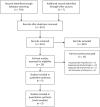The impact of omega-3 polyunsaturated fatty acid supplementation on the incidence of cardiovascular events and complications in peripheral arterial disease: a systematic review and meta-analysis
- PMID: 24885361
- PMCID: PMC4065588
- DOI: 10.1186/1471-2261-14-70
The impact of omega-3 polyunsaturated fatty acid supplementation on the incidence of cardiovascular events and complications in peripheral arterial disease: a systematic review and meta-analysis
Abstract
Background: Individuals with peripheral arterial disease are at higher risk for cardiovascular events than the general population. While supplementation with omega-3 polyunsaturated fatty acids (PUFA) has been shown to improve vascular function, it remains unclear if supplementation decreases serious clinical outcomes. We conducted a systematic review and meta-analysis to determine whether omega-3 PUFA supplementation reduces the incidence of cardiovascular events and complications in adults with peripheral arterial disease.
Methods: We searched five electronic databases (MEDLINE, EMBASE, CENTRAL, Scopus and the International Clinical Trials Registry Platform) from inception to 6 December 2013 to identify randomized trials of omega-3 PUFA supplementation (from fish or plant oils) that lasted ≥12 weeks in adults with peripheral arterial disease. No language filters were applied. Data on trial design, population characteristics, and health outcomes were extracted. The primary outcome was major adverse cardiac events; secondary outcomes included myocardial infarction, cardiovascular death, stroke, angina, amputation, revascularization procedures, maximum and pain-free walking distance, adverse effects of the intervention, and quality of life. Trial quality was assessed using the Cochrane Risk of Bias tool.
Results: Of 741 citations reviewed, we included five trials enrolling 396 individuals. All included trials were of unclear or high risk of bias. There was no evidence of a protective association of omega-3 PUFA supplementation against major adverse cardiac events (pooled risk ratio 0.73, 95% CI 0.22 to 2.41, I2 75%, 2 trials, 288 individuals) or other serious clinical outcomes. Adverse events and compliance were poorly reported.
Conclusions: Our results showed that insufficient evidence exists to suggest a beneficial effect of omega-3 PUFA supplementation in adults with peripheral arterial disease with regard to cardiovascular events and other serious clinical outcomes.
Figures



References
-
- What is peripheral arterial disease? http://www.nhlbi.nih.gov/health/health-topics/topics/pad/
-
- Leng GC, Papacosta O, Whincup P, Wannamethee G, Walker M, Ebrahim S, Nicolaides AN, Dhanjil S, Griffin M, Belcaro G, Rumley A, Lowe GD. Femoral atherosclerosis in an older British population: prevalence and risk factors. Atherosclerosis. 2000;152(1):167–174. doi: 10.1016/S0021-9150(99)00447-5. - DOI - PubMed
-
- Norgren L, Hiatt WR, Dormandy JA, Nehler MR, Harris KA, Fowkes FG. TASC II Working Group. Inter-society consensus for the management of peripheral arterial disease (TASC II) J Vasc Surg. 2007;45((Suppl S)):S5–S67. - PubMed
Publication types
MeSH terms
Substances
LinkOut - more resources
Full Text Sources
Other Literature Sources
Medical

